News
Corruption in Nigerian judiciary is extensive – UNODC

The United Nations Office on Drugs and Crimes (UNODC) says corruption is prevalent in the Nigerian judiciary.
A representative of the UNODC, Melissa Omene, said this on Friday at a judicial accountability event in Abuja.
The event was organised by Tapinitiative, a not-for-profit organisation
Speaking on a 2019 survey that was conducted by the UNODC and the National Bureau of Statistics (NBS), Ms Omene said the survey “found that 20 per cent of those who had contact with the Nigerian judiciary were confronted with a request for the payment of a bribe.
“Indeed, corruption in the Nigerian judiciary is extensive and both male and female judges are party to it.”
Giving a comparative analysis of the issue, a UNODC study on gender and corruption in 2020, disclosed that “male judges are far more likely to be involved in bribe-seeking conduct than their female colleagues.”
The study said corruption amongst judicial officers had eroded “public confidence in the judiciary.”
‘Why public trust in judiciary waning’
Weighing in on the quality of justice dispensation by Nigerian courts, a lawyer, Jibrin Okutepa, blamed lawyers and judges for the loss of public confidence in the judicial system.
Mr Okutepa, a Senior Advocate of Nigeria (SAN) and a former member of the Legal Practitioners Disciplinary Committee (LPDC), said the country is in a moral decay.
He decried the conduct of senior lawyers who compromise judges to get favourable verdicts.
“There is no accountability from the judiciary because the Nigerian society does not demand accountability,” he said.
The lawyer criticised the process of appointment of judges that is based on “rationing.”
Mr Okutepa pointed out that recent judgements of the Supreme Court on crucial cases dealt a fatal blow to public confidence in the judiciary to do justice on matters that come before it.
“The Supreme Court has elevated the rules of court above constitutional provisions. There is no accountability from the Nigerian judiciary,” he submitted.
He lamented that the age-old principle of judicial precedent has been bastardised across the courts in Nigeria.
“You can see five different decisions of the Supreme Court on one issue that are inherently contradictory,” Mr Okutepa said, adding that “precedents are set based on who is before the court.”
In the build-up to last year’s general elections, the Supreme Court delivered two separate judgements affirming the candidacy of Ahmad Lawan, a former Senate President, and Godswill Akpabio as authentic ticket-holders for the National Assembly elections in their respective states of Yobe and Akwa Ibom.
Messrs Lawan and Akpabio were presidential aspirants in the All Progressives Congress and could not have been aspirants at the same time for the parliamentary polls because of the latest provisions of the Electoral Act 2022.
But the Supreme Court in 2022 declared them winners of the legislative primary elections of the APC, a development that drew outrage amongst close observers of the Nigerian judiciary.
Mr Akpabio, a former governor of Akwa Ibom State and minister under ex-President Muhammadu Buhari, would later win the main election to become the current Senate President.
Similarly, a panellist at the event, Chioma Onyenucheya-Uko, said the judiciary missed an opportunity to bolster its public image when the Presidential Election Petition Court in Abuja last year rejected requests by the two leading opposition candidates – Atiku Abubakar and Peter Obi – to have the court’s proceedings televised.
The panel, moderated by Lillian Okenwa, a journalist and lawyer, said nepotism was commonplace in judicial appointments.
But, a former judge of the Federal High Court, Ibrahim Buba, rated Nigerian judges high in the discharge of their duties.
Delivering a keynote address on the topic, “Impact of judicial accountability on public trust in the legal system,” Mr Buba said Nigerian judges stood up to dictators and democratic leaders in their judicial functions.
“…having regards to the conditions and environment of work, with all modesty, I say KUDOS to the Nigerian bar and the Nigerian bench, take away politics, where people differ on opinions and questions of law and both may be right, the Nigerian judiciary has given a very good account of itself,” Mr Buba said.
He explained that politicians “who cannot have their way undermine the independence of the Nigerian judiciary, not only starving it of funds but ensuring an erosion of independence of the judiciary and having friction and try to remove the chief judges unconstitutionally.”
“Nigerian judges are courageous, very, very courageous, they have dared the military, they have dared the political class, like every society, they have also dealt even with their colleagues who are found wanting.”
News
Protesters call for suspension of FUOYE VC over alleged sexual harassment
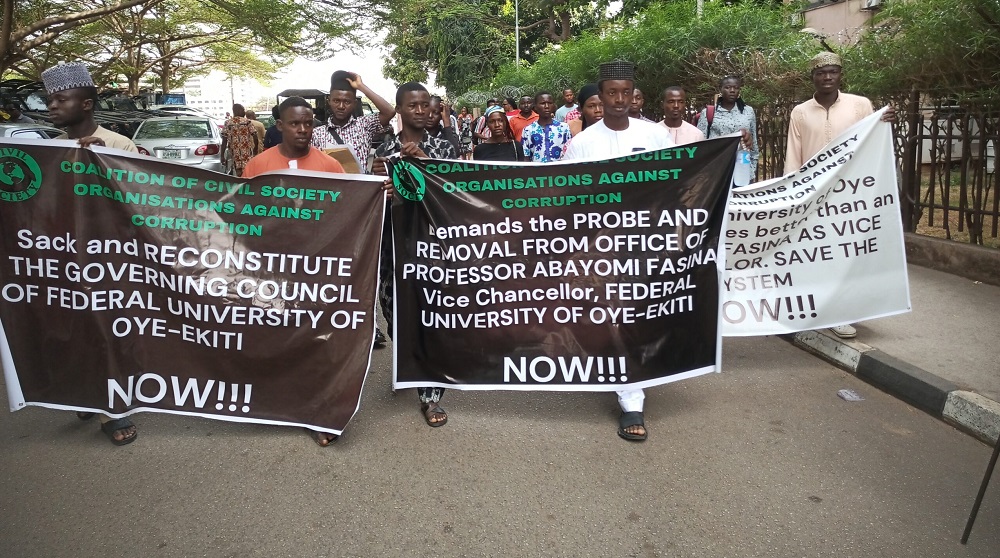
A group of protesters have converged on the Federal Ministry of Education in Abuja, calling for the suspension of Professor Abayomi Fasina as Vice-Chancellor of the Federal University, Oye-Ekiti (FUOYE), to allow proper investigation into sexual harassment allegation.
Protesters armed with placards-bearing slogans such as ‘Ekiti Deserves Better’ and ‘Protect Our Women,’ argued that the Vice-Chancellor cannot remain in office while facing investigation for sexual harassment allegations.
The embattled VC has been under investigations over allegations made in a leaked voice note regarding a sexual harassment case against one of his married subordinates.
Speaking to journalists after submitting a petition to the Minister of Education, Tunji Alausa, the leader of the protesters under the aegis of Coalition of Civil Society Organisations Against Corruption, Victor Adetola, said suspending the VC would give room for thorough investigations into the matter.
Adetola said: “We have looked at the developing story that has been going on in that university as an organisation that is fronting for the welfare of Nigerian students and the community or the educational community generally.
“The issue will be festering if there is no thorough investigation, and we need that place to be sanitised. Honestly, currently there is a disciplinary action investigation that is going on that was first given a three-week ultimatum.
“After that, they requested for another three weeks ultimatum, even inclusive of the governing council. And for the past six months, nothing has been done. We see that a lot of undiagnosed, a lot of corruption has been festering.
“In fact, one of the most critical issues happening is the sexual harassment that has happened to one of the married assistant directors in that school.
“Specifically, it’s necessary that the leader of the university steps down first, or the governing council relieves him of that position first, so that independent investigation can be carried out on all the petitions that we have written.”
News
NJC, NBA raises concerns as Uzodimma names Nzeukwu Imo’s acting Chief Judge
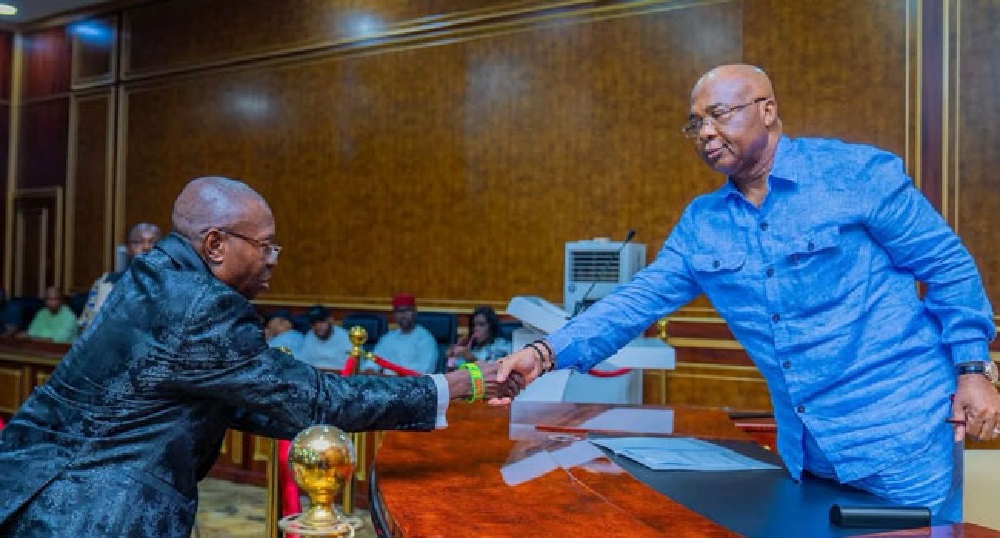
The National Judicial Council (NJC) has distanced itself from the purported appointment by Governor Hope Uzodinma of Justice Theophilus Nnamdi Nzeukwu as the acting Chief Judge of Imo State.
The NJC, in a statement by its Deputy Director (Information), Mrs. Kemi Ogendengbe said it was yet to consider a request by Uzodinma to appoint Justice Nzeukwu, who is currently number four in the hierarchy of judges’ seniority in Imo State High Court.
The statement reads: “The attention of the council has been drawn to the news making rounds that the Governor of Imo State, His Excellency, Senator Hope Uzodimma, CON, had purportedly appointed Hon. Justice Theophilus Nnamdi Nzeukwu, who is number four in the hierarchy of judges seniority in Imo State High Court, as the acting Chief Judge of the state, in view of the recent disciplinary action taken against the erstwhile Chief Judge of the state.
“The National Judicial Council, by this press release, wants to clarify to the public that the Governor of Imo State had earlier written to the council requesting for its approval to appoint Hon. Justice Theophilus Nnamdi Nzeukwu, who is number four in the hierarchy of seniority as acting Chief Judge of the state.
“The governor in his said correspondence to the council, gave reasons why in his own view, the three most senior judges are not appointable.
“The council is informing the public that the said letter is yet to be considered, as deliberation on the request is slated for the next council meeting, which is scheduled to hold on 29th and 30th April, 2025.
“The council is therefore, by this press release, informing the public that the governor’s request is yet to be considered by the council.
“The council has not given approval to the governor for the appointment of the acting Chief Judge.
“The council is not a party to the process of the purported appointment of Hon. Justice Theophilus Nnamdi Nzeukwu as the acting Chief Judge.”
The NJC had, at its 107th meeting held between November 13 and 14, 2024 recommended the compulsory retirement of the then Chief Judge of Imo State, Justice T. E. Chukwuemeka Chikeka over alleged age falsification.
It said Justice Chikeka was recommended to the Imo State Governor for compulsory retirement with effect from October 27, 2021, with all salaries and allowances the judge received in excess from the said date refunded to the council.
The NJC added: “The recommendation was pursuant to the findings of the Council that His Lordship has two different dates of birth: 27 October 1956 and 27 October 1958.
“However, 27 October 1956 appeared to be the consistent date of birth, but in 2006, the Chief Judge swore to an affidavit changing the date of birth to 27 October 1958.”
Meanwhile, the Nigerian Bar Association (NBA) Owerri Branch has expressed serious concerns over the appointment.
Speaking after swearing in the new Acting Chief Judge, Governor Uzodimma recalled the disgraceful manner the former Chief Judge was removed from office by the NJC, and the events that followed thereafter, and warned against a repeat of what he described as “dishonourable incident where a Chief Judge is suddenly removed from office for such an ugly indictment of age falsification.”
Reacting to the appointment, the NBA urged Governor Uzodimma to adhere to due process in the appointment of a new Chief Judge, emphasising the importance of following established protocols to ensure transparency and legitimacy.
According to the NBA, Nzeukwu’s appointment violates the provisions of the 1999 Constitution, which stipulates that the most senior judge of the High Court should be appointed as Acting Chief Judge in the event of a vacancy.
“We insist that due process must be followed in the appointment of the Acting Chief Judge,” Chairman of the NBA Owerri Branch, Chief Chris U. Ihentuge and the Secretary, Daniel O. Odiba, said in a statement yesterday.
According to the statement: “If the most senior judge or judges were bypassed, the rationale for this deviation must be immediately justified.”
Failure to do so, they warned, will further erode public confidence in the judiciary.
The NBA demands that Governor Uzodimma takes immediate action to address this situation and reverse the appointment, which they deem inconsistent with the Constitution.
The statement reads in part: “The Nigerian Bar Association, Owerri Branch demands that the Governor should, immediately, take steps to address this situation and reverse this action which is inconsistent with the Constitution. Failure to do so will further erode public confidence in the judiciary at a time when trust in our institutions is already fragile. The Bar shall also take all steps necessary in the circumstance.
“The Nigerian Bar Association, Owerri Branch, reiterates that it has no interest in any particular individual holding the office of the Chief Judge, but it is deeply committed to the protection of due process, the rule of law, and the sanctity of the Constitution.
“The NBA Owerri Branch has communicated its concerns to the Imo State Attorney General and Commissioner for Justice, the Body of Senior Advocates of Nigeria (BOSAN), Imo State Chapter, the Judicial Service Commission (JSC) of Imo State, the President of the Nigerian Bar Association, and the National Judicial Council (NJC).”
News
SAD! APC publicity scribe dies in UK
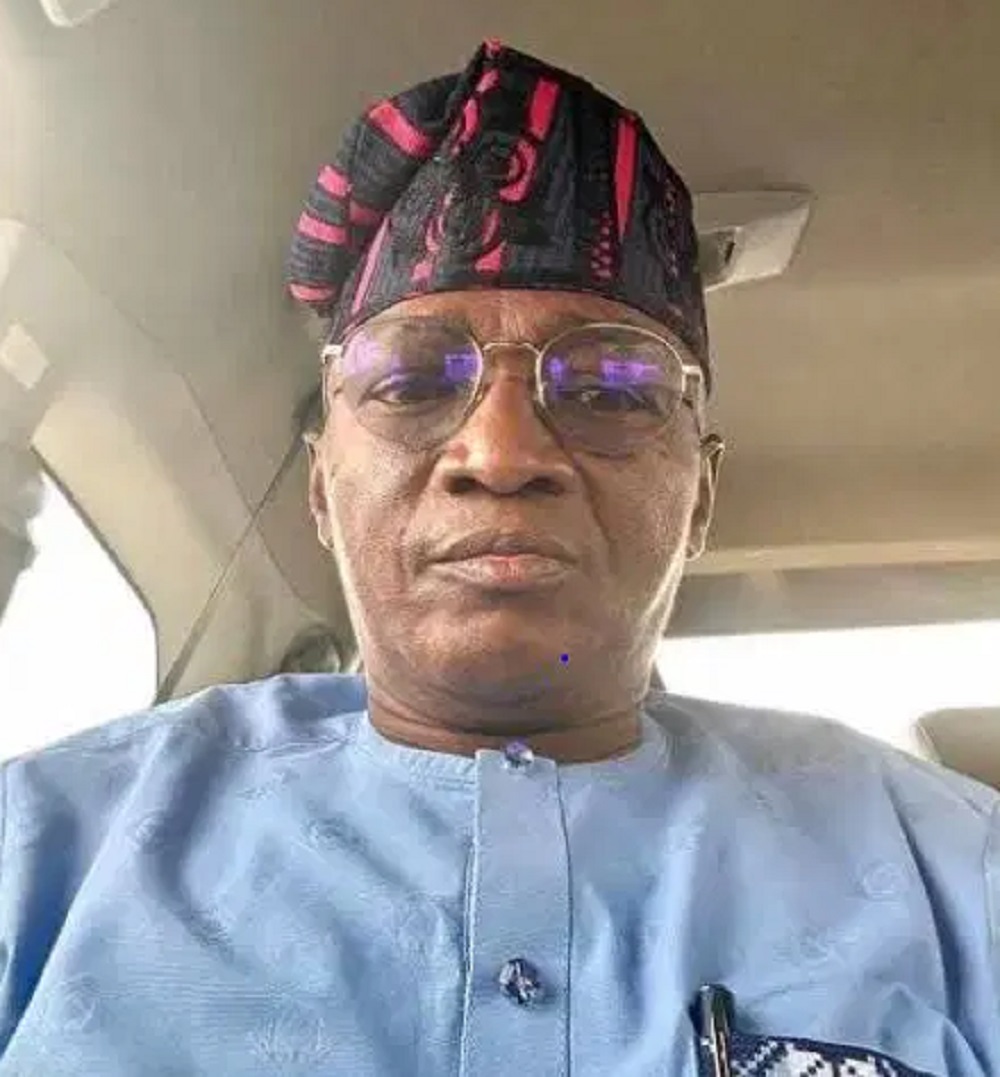
The Publicity Secretary of the All Progressives Congress (APC) in Ogun State, Mr. Tunde Oladunjoye, has died.
Oladunjoye, who hailed from Ijebu-Itele in Ijebu East Local Government Area, reportedly passed away in the United Kingdom after a prolonged illness.
His family, in a statement announcing his passing, said: “It is with deep sorrow and total submission to the divine will of Almighty Allah that we announce the passing of our beloved father, husband, brother, and esteemed leader, Alhaji Abdulraheem Olatunde Ayinde Oladunjoye, who returned to his Lord on Friday, 4th April 2025.”
Funeral arrangements, the family added, will be announced in due course.
Reacting to the news, Ogun State Governor, Prince Dapo Abiodun, described Oladunjoye’s death as a devastating loss to the party and the state.
In an emotional tribute, the governor expressed disbelief and shock over the passing of the seasoned spokesman and government consultant, saying Oladunjoye was a dynamic and loyal politician who died in his prime.
He said: “Receiving the news of the departure of our gallant, highly resourceful, uncommonly cerebral and hard-working party spokesman and consultant, Tunde Oladunjoye, was devastating for me. This is tragic news that is frankly difficult to fathom.
“Oladunjoye never believed in half measures. He defended the programmes, policies, and image of the Ogun State government with uncommon dedication. He was an effective and accomplished spokesman whose brilliance was never in doubt.
“He was the voice of courage and easily the best spokesman Ogun APC has ever produced. His tenacity, doggedness, and loyalty were evident, and he contributed immensely to the growth of our party and the successes of this administration.”
Governor Abiodun also extended his condolences to Oladunjoye’s immediate family, the Ogun APC family, and his associates, describing him as “a good man who will be sorely missed.”
Before his role as the party’s spokesman, Oladunjoye served as Chairman of Ijebu East Local Government Area.
-

 News21 hours ago
News21 hours agoJust in: Gunmen Hijack Loaded Bus,K!!ll Driver, Abduct Passengers
-

 News13 hours ago
News13 hours agoJUST-IN: Burkina Faso President Traore Reportedy Survives Another Assassination Attempt
-

 News5 hours ago
News5 hours agoFull list: NNPC appoints new senior management team
-

 News17 hours ago
News17 hours agoDamaged reputation: Akpabio drags Abbo, Natasha to court
-
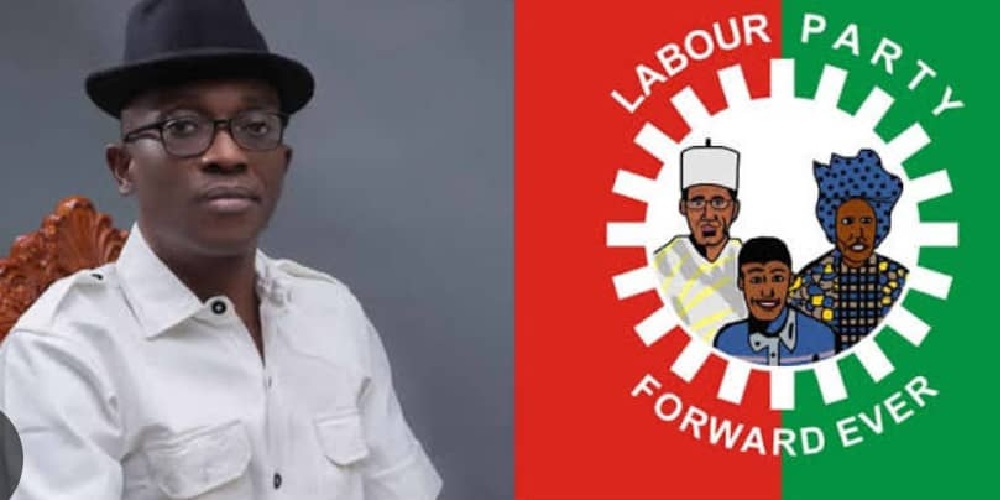
 News22 hours ago
News22 hours agoJust in: Supreme Court sacks ,Abure as LP chairman
-

 News22 hours ago
News22 hours agoTinubu’s Political Adviser, Baba-Ahmed Resigns
-
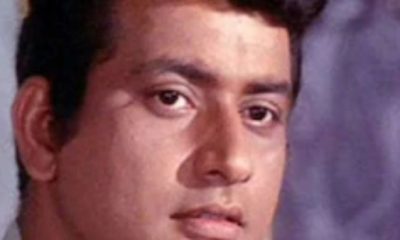
 News19 hours ago
News19 hours agoFamous Indian movie star, Manoj Kumar is dead
-
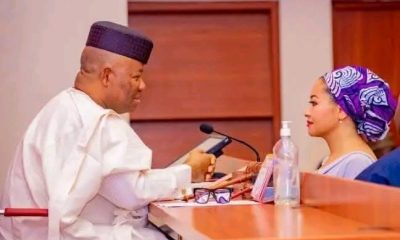
 News24 hours ago
News24 hours agoThere’s valid evidence of Akpabio sexually harassing me; I’ll release it, Natasha Akpoti-Uduaghan declares





